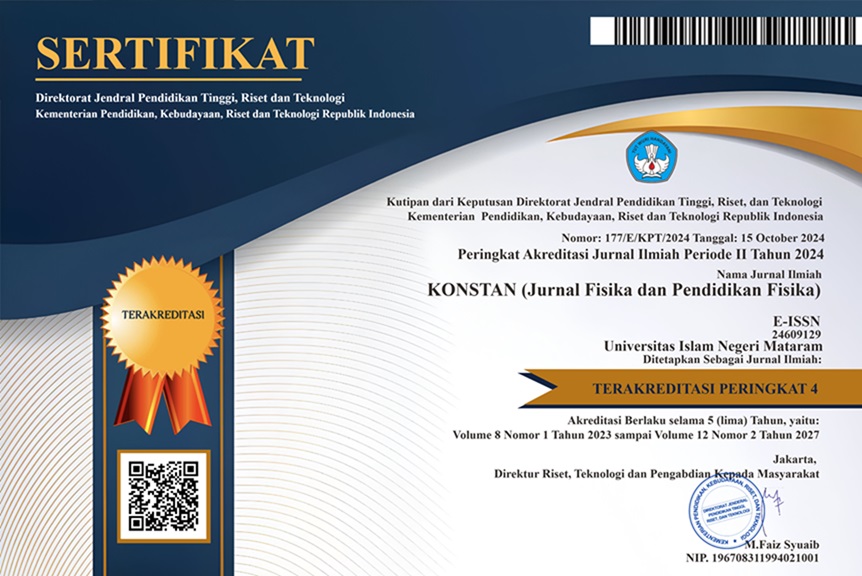Exploring Ethnoscience in Science Education: A Systematic Literature Review from 2020-2025
Abstract
This study aims to explore the application of ethnoscience in science education through a systematic literature review from 2020 to May 2025. Ethnoscience, as a culturally-based educational approach, plays a crucial role in contextualizing scientific concepts in students' daily lives. This study employs the PRISMA protocol to ensure traceability and transparency in data collection. Of the 76 articles that met the inclusion criteria, most studies were conducted in Indonesia, focusing on primary and secondary education. The findings reveal that ethnoscience research in science education contributes to improving scientific literacy and 21st-century skills and integrating local wisdom values into pedagogical approaches. However, there remains a lack of cross-country research or intercultural comparisons. This study recommends further research with empirical classroom approaches and cross-cultural studies to enhance the validity and transferability of findings. The results of this review provide valuable insights for curriculum developers, educators, and policymakers to design culturally responsive science learning that aligns with students' sociocultural contexts. The integration of ethnoscience can serve as a strategic approach to promote inclusive education, foster identity awareness, and support the sustainability of local knowledge in formal science curricula.
Downloads
References
[2] H. Hikmawati, I. W. Suastra, and N. M. Pujani, “Ethnoscience-Based Science Learning Model to Develop Critical Thinking Ability and Local Cultural Concern for Junior High School Students in Lombok,” J. Penelit. Pendidik. IPA, vol. 7, no. 1, 2020, doi: 10.29303/jppipa.v7i1.530.
[3] Y. Rahmawati, A. Ridwan, U. Cahyana, and T. Wuryaningsih, “The integration of ethnopedagogy in science learning to improve student engagement and cultural awareness,” Univers. J. Educ. Res., vol. 8, no. 2, 2020, doi: 10.13189/ujer.2020.080239.
[4] N. Nurhasnah, L. Lufri, and A. Asrizal, “Effect Size Analysis of the Implications Ethnoscience Approach to the Improvement of 21st Century Skills in Science Learning,” J. IPA Pembelajaran IPA, vol. 6, no. 3, 2022, doi: 10.24815/jipi.v6i3.26116.
[5] W. Wahyudi, N. N. S. P. Verawati, I. Islahudin, and S. Agustina, “Hybrid Ethno-Project Based Learning Integrated With Virtual Assistive Technology to Enhance Students’ Critical Thinking in Fundamental Physics Course,” TEM J., vol. 12, no. 4, pp. 2006–2012, 2023, doi: 10.18421/TEM124-11.
[6] D. H. Pratama and J. Jumadi, “Analysis the Implementation of Ethnoscience Approach in Learning Science,” J. Penelit. Pendidik. IPA, vol. 9, no. 4, 2023, doi: 10.29303/jppipa.v9i4.2721.
[7] Kemdikbud, “Buku Saku Kurikulum Merdeka; Tanya Jawab,” Kementeri. Pendidik. dan Kebud., p. 141, 2022.
[8] I. Rohmawati and F. Wulandari, “The Influence of Ethnoscience-Based Problem Based Learning Model on Student Learning Outcomes in Natural Science Learning Class 5 Elementary School,” Acad. Open, vol. 8, no. 1, 2023.
[9] A. M. Alfian, N. Nasir, and A. Akram, “Efektivitas Penggunaan Media Pembelajaran Edmodo Terhadap Hasil Belajar IPA Siswa SMPN 1 Sungguminasa Kabupaten Gowa,” J. Literasi Digit., vol. 2, no. 3, 2023, doi: 10.54065/jld.2.3.2022.220.
[10] H. Hikmawati, I. W. Suastra, K. Suma, A. A. I. A. R. Sudiatmika, and R. Rohani, “Effect of Problem-Based Learning Integrated Local Wisdom on Student Hots and Scientific Attitude,” J. Penelit. Pendidik. IPA, vol. 7, no. SpecialIssue, 2021, doi: 10.29303/jppipa.v7ispecialissue.1118.
[11] O. L. Malapane, W. Musakwa, N. Chanza, and V. Radinger-Peer, “Bibliometric Analysis and Systematic Review of Indigenous Knowledge from a Comparative African Perspective: 1990–2020,” Land, vol. 11, no. 8, 2022, doi: 10.3390/land11081167.
[12] J. Aulia, N. D. Permana P, Z. Zarkasih, and T. L. Nova, “Meta-Analisis Pengaruh Penerapan Pendekatan Saintifik Berbantuan Komik terhadap Hasil Belajar IPA Siswa SMP,” J. Nat. Sci. Integr., vol. 3, no. 1, 2020, doi: 10.24014/jnsi.v3i1.9617.
[13] F. Hoque, R. M. Yasin, and K. Sopian, “Revisiting Education for Sustainable Development: Methods to Inspire Secondary School Students toward Renewable Energy,” Sustain., vol. 14, no. 14, 2022, doi: 10.3390/su14148296.
[14] Z. Yu and W. Xu, “A meta-analysis and systematic review of the effect of virtual reality technology on users’ learning outcomes,” Comput. Appl. Eng. Educ., vol. 30, no. 5, 2022, doi: 10.1002/cae.22532.
[15] D. White and S. Delaney, “Full STEAM ahead, but who has the map for integration? - A PRISMA systematic review on the incorporation of interdisciplinary learning into schools,” LUMAT, vol. 9, no. 2, 2021, doi: 10.31129/LUMAT.9.2.1387.





